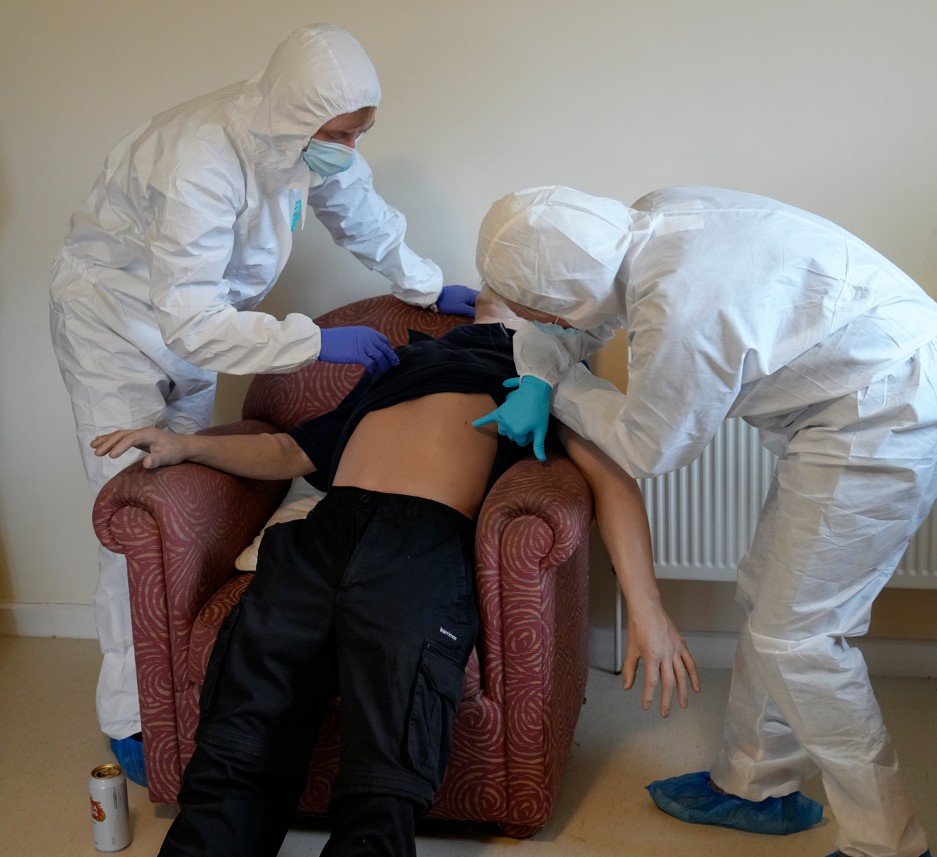Deputy vice-chancellor Prof Michelle Jones, Dave Moore, lecturer Hebe Unwin, Police, Alison Hernandez and vice chancellor Prof Claire Taylor
Devon is leading the way to address an urgent need to recruit more digital forensic officers to work in police forces.
Devon is leading the way to address an urgent need to recruit more digital forensic officers to work in police forces.
Last year Devon & Cornwall Police’s specialist Digital Forensics Unit investigated more than 3,000 digital devices containing more than 2 petabytes of data – the equivalent of two million movies or a 41,455 mile high stack of A4 paper enough to go around the world 1.66 times - in all levels of crime from drug offences through to child abuse, murder, and terrorism offences.
Digital forensic officers use specialised tools recover, analyse and present digital evidence from electronic devices to support investigations into crimes and security incidents, and help secure successful convictions.
Due to the ever-increasing expansion of technology, there are currently not enough digital forensic officers to keep up with demand. Helping to bridge that gap is Plymouth Marjon University.

It has been running criminology and forensic degree courses for several years but this year an updated version of them was launched. One key change has been introducing a Forensic Investigation degree because the vast majority of students want to get into police investigation roles such as being a crime scene investigator or a detective.
The course offers strong practical experiences using the university’s very own fully equipped crime scene house and laboratories. A new digital forensics module has been added to teach in-demand skills in the rapidly growing field.
Course leader Dave Moore previously served with Devon & Cornwall Police for 28 years. All tutors have experience working in the field, alongside being academics, and frequently invite guest lecturers to share their experience as well. It is positive change in contrast to the recent news that Cranfield University in Bedfordshire is axing its masters in forensic investigation course next year and has reduced its current modules, including not offering digital scene forensics.
Police and Crime Commissioner Alison Hernandez visited Plymouth Marjon University to meet students on the course who one day could be employed by Devon & Cornwall Police.
She said: “Digital evidence plays a significant role in the majority of police investigations and is vital in helping arrest and convict offenders and give victims justice. The volume of that work is growing all the time.
“It was wonderful to see how the university has responded to this demand by creating a new course specifically aimed at boosting recruitment numbers within forensics, particularly digital forensics. The students I met were enthusiastic and committed, and have given me great hope for the future.”
The sentiment has been echoed by Steve Slater, Head of Digital Forensics of South West Police Collaboration, who has explained why it is essential that universities offer digital forensics modules.
He said: “Digital evidence has experienced the highest growth in demand policing has faced over the last decade. Every crime will have a digital evidence element whether this is from a mobile phone, dash cam, wearable camera, or home ‘internet of things’ devices.
“Digital evidence provides a wealth of information to support victims of crime, from traditional evidence such as illegal content but, increasingly today, the location of users, movements, and timeline of events and also invaluable health information from wearable devices.
“As society continues to evolve with automation, AI and technology, Devon & Cornwall Police is committed to maintaining pace with society’s use of this technology, supported through the Police Reform Act and Policing Vision 2030. We’re already three years into a five-year investment plan to increase our capabilities and resources in digital forensics and are leading the way nationally in many areas.”
The force was at the forefront nationally in the creation of a collaboration of its forensic service provision through the creation of South West Forensics across the four south west police forces with Avon & Somerset, Dorset, and Wiltshire.
Steve continued: “Today, other forces are following this model and now more than 50 per cent of digital forensics nationally sit within traditional forensics structures. We won’t stop there though. Our DFU actively engages with partners from private industry and academia to ensure our workforce, processes and technology continue to evolve with the pace of change. I’m pleased to be working with Marjon University who clearly understand our demands and challenges.”
Professor Claire Taylor, Vice-Chancellor of Plymouth Marjon University, said: "Here at Marjon we are committed to educating exceptional graduates for careers within public services, professional and community sectors. Our Forensic Investigation programme is a direct response to regional need identified by key employers.
“The course features practice-based learning, simulation activity based in our crime scene house, access to specialist labs and high-quality academic credentials, as reflected in our national rankings including being a UK top 10 university for teaching quality.
“It has been great to welcome the Police and Crime Commissioner who was very interested in seeing at first-hand what we are achieving."
For more details about the course, please visit BSc Forensic Investigation | Plymouth Marjon University
Key stats:
Subscribe or register today to discover more from DonegalLive.ie
Buy the e-paper of the Donegal Democrat, Donegal People's Press, Donegal Post and Inish Times here for instant access to Donegal's premier news titles.
Keep up with the latest news from Donegal with our daily newsletter featuring the most important stories of the day delivered to your inbox every evening at 5pm.